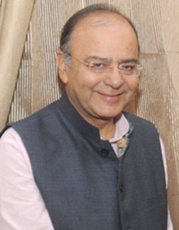GST deal likely soon as Jaitley agrees to most demands from states
16 Dec 2014
 Finance minister Arun Jaitley seems to be close to a deal on the national roll-out of the contentious goods and services tax (GST) as he has met most of the demands raised by the states, clearing the hurdle for the introduction of the Constitution amendment bill during the current session of Parliament.
Finance minister Arun Jaitley seems to be close to a deal on the national roll-out of the contentious goods and services tax (GST) as he has met most of the demands raised by the states, clearing the hurdle for the introduction of the Constitution amendment bill during the current session of Parliament.
If all goes well the passage of the Constitution amendment bill will pave way for the introduction of the most important tax reform since Independence, from April 2016.
But a GST that would create a unified market by ending multiple levies by the centre and the states is unlikely to be realised any soon as the centre has agreed to dilute the GST by giving in to some of the states' demand to be allowed to levy some taxes that are crucial for states' revenue mop-up.
The centre is reported to have conceded some ground on petroleum products by suggesting that it could be kept out of GST in the initial years, but included later.
States mop up huge sums by way of tax on petroleum products and it would be difficult for some states to do away with this without finding an alternative source of revenue.
Similarly, it has agreed to allow the states' demand for an additional levy in lieu of entry tax, which will be subsumed into the combined tax on goods and services.
Manufacturing states led by Gujarat too will be allowed to levy a "transitionary tax for one or two years".
Moreover, the centre has provided guarantees to states on meeting their entire revenue losses for five years after GST rollout. This provision would also be incorporated into the Constitutional amendment bill, although the details will be finalised only after consulting the law department.
Jaitley's breakthrough on the elusive goods and service tax (GST) issue, however, is unlikely to pave the way for a single nationwide market so long as states continue to levy their own taxes.
While these flexibilities will change the character of the GST by making it a less universal tax regime, the Centre may also reduce the overall compensation over time. In any case, it is better to have an imperfect GST regime than having no GST at all, opine commentators.
"The matter (GST) was discussed elaborately. The discussions are moving in a positive direction," said Jammu & Kashmir finance minister Abdul Rahim Rather, who is also the head of the empowered group of state FMs.
While most states are willing to support the bill, states like West Bengal are seen to be a major hurdle in ensuring the passage of the Constitutional Amendment Bill.
Once the Constitution Amendment Bill is approved, the government will introduce the GST Bill, which will lay down the contours of the new tax regime. The centre is hoping to finalise the revenue-neutral rate, which is expected to be in the region of 11-12 per cent.




















